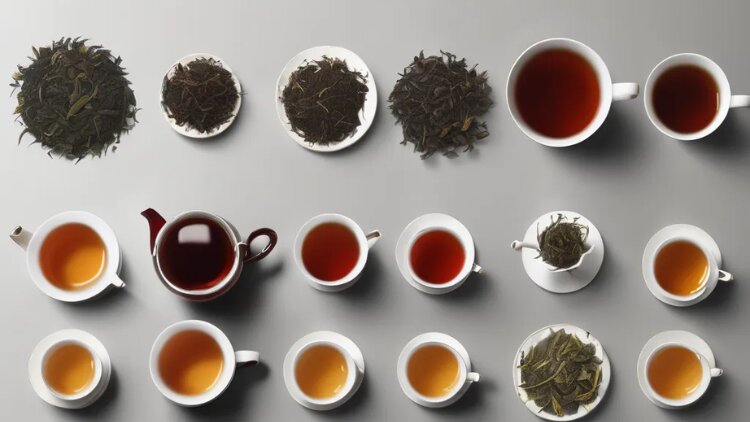Does Tea Expire? How Long Does Tea Last?
Mar 02,2024 | TeaTsy Team
Since ancient times, a good cup of tea served with a fine tea set has been an enjoyable leisure activity. It does not matter when you brew it; tea has been a magical beverage that keeps us going. However, many people have failed to keep track of the expiration date of their beloved tea.
Although consuming expired tea might not make you sick, the flavor and potency will surely be reduced drastically. We understand the complexity that you face when deciding how long tea lasts. Hence, this article goes into detail on how long you can keep different varieties of tea. At the same time, we provide you with steps to know if a tea has expired and let you know if it's possible to drink expired tea. Let's get started.

How Long Does Tea Last?
How long does tea last is dependent on the type of tea you are talking about. The saying that a tea expires or lasts a certain period might not be a very straightforward answer to give. This is because tea does not expire or go rotten like other beverages, contrary to your belief. One thing every tea lover should know is that expiration dates are often conservative estimates and not the sole factor to determine when a tea will last or expire. What happens to tea is simply a reduction in its flavor and degradation in taste. This reduction happens mostly when the tea has stayed far too long or outlasted its time on your shelf or storage. For instance, you'll get a more flavorful and good taste from fresh tea compared to the old tea that has been in storage for months or years.
How Long Does Loose Tea Last?
Loose tea has been a beloved choice for many due to its concentrated nutrients, original flavor, customization possibilities, and health benefits. However, this level of specialty that's attributed to loose tea comes with one question, which is how long loose tea lasts before it loses its flavor. When it comes to determining the shelf life of loose tea, you have to take into consideration various factors. The factors are packaging, processing, oxidation level storage condition, and most importantly, tea type.
Generally, most loose tea lose their flavorful taste between 1 to 2 years. You mustn't take too much to this timeframe because they are just rough estimates and do not apply to all teas. Beyond this populous conception of the expiry date and best before that most tea brands have used to project when tea is not safe for consumption. You should always rely on your sense of smell, taste, and touch. For example, If your tea smells dull, brew weak, or lack vibrancy, it's time to let it go.
Types of Loose Tea and Their Shelf Life
Loose tea has a diverse range of varieties, such as Oolong, white tea, green tea, Puerh, and many others. Despite these enjoyable varieties, it's important to understand how long each type lasts to maximize your tea enjoyment.

Black Tea
Black tea has become a comforting beverage for every tea lover worldwide. Black tea is derived from the Camelia Sinensis plant, like every other type of loose-leaf tea. However, the characteristic blend of flavor and caffeine that you enjoy from this type of tea comes from its processing, where the leaves are exposed to air for heavy oxidation. This process has a lot of influence on the blackish-brown appearance and how long black tea would last in storage.
The good news is that black tea generally lasts longer. With proper storage and a complete oxidation cycle, loose-leaf black tea is expected to last 12 months to 3 years, while those in tea bags should last you between 12 to 24 months. Additionally, you can also determine the condition of a black tea with a smell and taste test. If your black tea aroma is weak, the tea has lost its taste. On the other hand, if the tea flavor has become soft or dull, it's time to get a fresh batch.
White Tea
White tea is known for its light and subtle flavors. Studies have linked white tea to a variety of health benefits, including weight management, reduced risk of cancer, and lower heart diseases. White tea is derived from young, unopened buds and tender leaves of the Camellia Sinensis plant.
The leaves are now processed through minimal sun drying or pan drying to retain their antioxidants and freshness. This level of mild processing has a significant impact on how long white tea lasts in storage or shelf life. Properly stored white loose-leaf white tea can only last 12 to 24 months, while those in tea bags can still retain their good flavor for just 6 to 12 months.
Green Tea
Green tea is a delicious beverage that is enshrined in cultural significance. This is another popular choice among tea lovers who enjoy its delicate aroma and health benefits. Like every other, green tea comes from the Camellia Sinensis plant variety. The flavor and its longevity are reliant on the cultivation practices and, most importantly, the production processes.
Ideally, Chinese green teas are pan-fried. This process involves the heating of the tea leaves in a basket or rotating drum to stop its oxidation process. Another method is the steam-heated process that's predominantly used to produce Japanese green tea. The tea leaves are steamed for a few hours to bring out the vibrant greenish color of the tea. However, due to the minimal oxidation of green tea and its delicate nature, green tea can only last about 6 to 12 months before its flavor starts to fade away.
Oolong Tea
Oolong tea is characterized by its unique flavor profile that ranges from floral and green to sweet and fruity. Oolong tea is another favorite among tea enthusiasts because of its mix of the vegetal taste of green tea with the malty notes of black tea. The processing method that oolong tea passed through is quite distinctive compared to what we've seen before. Like most other teas, Oolong tea also comes from the leaves of the Camellia Sinensis plant.
What differentiates Oolong tea is the degree of oxidation that ranges between 8% to 85% and then subjected to another frying and heating process to stop the oxidation process. Therefore, light Oolong tea or less-dried ones with less than 50% degree of oxidation can last between 6 months to 2 years. In comparison, heavily dried dark Oolong tea with 50% and above degree of oxidation can last 1 to 3 years or more.
Pu-erh Tea
Pu-erh tea is a fermented tea, meaning the tea leaves are subjected to a process of fermentation after they have been dried and rolled. This is another highly sought-after tea in modern society, especially in the Western world. Pu-erh tea acclaims this level of acceptance based on its mellow, earthy taste of cocoa and mushrooms. Additionally, Pu-erh tea has been discovered to aid digestion and is a source of important nutrients, among other benefits.
Pu-erh tea can be classified into two categories based on the method of processing. The Raw Pu-erh (sheng) variant is left to age naturally, while the other one, Ripe or Cooked Pu-erh (shou), is subjected to an accelerated fermentation process. As a fermented tea, Pu-erh tea acts like a fine wine that can only improve in tasting as it ages. This means Pu-erh tea can last for centuries or decades without losing taste.
How to Know if Tea is Expired
Traditionally, tea does not expire. What can only happen to tea is the degradation of flavor, quality, and taste over time. To get a full picture of the current state of your tea, you need to have confidence in your senses. For instance, use your eyesight to judge the vibrancy of your tea. A green tea should maintain that greenish color, while a black one should maintain its dark brown.
So, any identified change or fade in the color of a tea means they have lost some freshness. Also, you can rely on your sense of smell to decide if your tea has expired or not. Tea with a fresh aroma is an Indication of freshness and is suitable for drinking. A musty or stale-smelling tea is likely to have passed its prime. Lastly, another trusted way to know if your tea has expired is by taste. A good tea should have that flavorful taste and be enjoyable when drinking. If you are having some wack, flat, or one-off taste from your tea, you should discard them.
Can You Drink Spoiled Tea?
The idea behind spoiled yea requires a bit more nuance because tea does not expire or spoil like normal food. Based on this reality, Drinking spoiled tea won't have any side effects or cause any life-threatening consequences. But it is best if you protect yourself from such things because of the mold infestations and weaker flavor that might not be palatable to your sense of taste. It's better if you order another batch of tea to satisfy and upgrade your tea experience.
How to Savor Your Tea Experience with TeaTsy
TeaTsy is a renowned company that was founded on the premise of ensuring you have a flavorful tea experience with our good quality tea products and tea accessories. We understand that tea has transcended beyond a mere beverage to a comforting companion that fits every gathering and mood. This is the basis on which we provide every tea lover with our collection of purely crafted and sustainable tea accessories. As a customer-friendly brand, we provide you with exceptionally fast delivery worldwide and a 60-day no-asked return policy to ensure your satisfaction. Check out our collection today to enjoy a mouthwatering tea experience.
Final Thought
While it's technically impossible for tea to expire or go rotten like perishable items, it can also lose its freshness and taste. However, with good storage and processing methods, tea generally has a long shelf life. Most teas generally take at least 6 months before they show signs of degradation, while some, like the fermented teas, can take decades before they lose their magic.
Another important question is if it is possible to take spoiled tea. While taking spoiled tea won't make you sick, it's important if you stay away from it because of its poor taste and unwholesome nature. Lastly, if you are unsure of your tea's freshness, you should just give it a sniff or taste it to determine whether they are still alive or requires you to purchase new tea.







